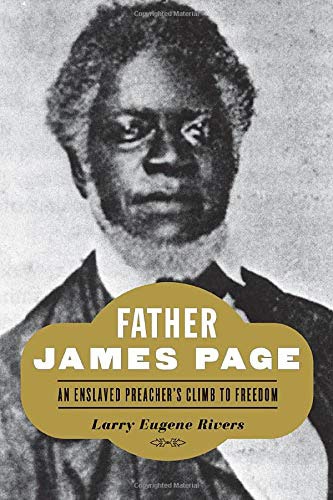Dr. Larry E. Rivers’ deeply researched and inspiring book Father James Page: An Enslaved Preacher’s Climb to Freedom traces an overseer’s life and an enslaved preacher from slavery to freedom. This is the ninth book that Rivers, a distinguished professor of history at Florida A&M University, has authored or co-authored on the African American experience.

Overall, this study describes and analyzes the brutal uprooting of an enslaved teenager, the loss of home, the loss of a father, the loss of a mother, the loss of a brother and the loss of friends and loved ones to make life more comfortable for the White slave-holding family.
Because Page lost his biological father to drowning off Liberia’s coast and his mother and brother on the auction block to provide his master with funds to uproot him and other enslaved persons from Virginia to Florida, I found this book a heart-wrenching read. Taught literacy by his master, Page served his enslaver from a little boy working in his master’s general store in Richmond, Virginia, to working as an enslaved overseer in Florida.
During the 1850s, the price of cotton was generally high, and slaveholders were, by and large, making money. This seems to be the case with Page’s master, John Parkhill. The enslaver did not die a broke man. And yet, after serving his master consistently for over forty-five years, the enslaver did not see fit to free Page upon his death in 1855.
The religious leader goes on with his life as a husband to his wife Elizabeth and father to their son Thomas. He continued to experience successes and tragedies when freedom came during Reconstruction.
 Dr. Said Sewell
Dr. Said SewellRivers does a yeoman’s job of integrating the times in which Page lived and how those times and the people he came in contact with helped to shape his worldview. At times, the story of James Page’s life made me sad, mad and then filled with hope. He had, unfortunately, many faults and contradictions in his life. He ends up being a male chauvinist, a sexist, a pluralist and a segregationist. Yet, his life is significant overall, given his contributions to building up the Baptist denomination throughout the South, particularly in Florida.
As an ordained minister, a political scientist and one who has written on the African American church, I always wanted to learn more about enslaved preachers, but there are very few books written about their lives. There are over 50,000 books on the Civil War and counting, several good books on capitalism and slavery, books on U.S. presidents and slavery, books on White women slaveholders and books that focus on various aspects of the enslaved Black community, such as the slave family, slave resistance, slaves in the cities, slaves and free Blacks before the Civil War, and other similar subjects. Yet, we do not know very much about male or female enslaved preachers.
Well, we do now with the publication of Father James Page. And this book is not just about James Page, it is about the many events and ideas swirling around during the nineteenth century that influenced the religious leader’s life and worldview.
There is much more I could say about this book. Suffice to say, Rivers’ meticulous research is quite apparent. This is no hagiography. It is a detailed no-holes-barred biography that analyzes the life of a 19th century enslaved preacher that is well overdue. It took Rivers over 25 years to complete this book. With this significant biography’s publication, I hope other scholars will use it as a model to write about the lives of other nineteenth-century male and female enslaved preachers in the near future.
Dr. Said Sewell is the director of the Office of Academic, Research, and Student Success.
This article originally appeared in the February 18, 2021 edition of Diverse. Read it here.


















